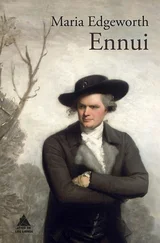“But to proceed with my important history.—I will not tire you with fighting over again all my battles in my seven years’ war with Mrs. Luttridge. I believe love is more to your taste than hatred; therefore I will go on as fast as possible to Clarence Hervey’s return from his travels. He was much improved by them, or at least I thought so; for he was heard to declare, that after all he had seen in France and Italy, Lady Delacour appeared to him the most charming woman, of her age , in Europe. The words, of her age , piqued me; and I spared no pains to make him forget them. A stupid man cannot readily be persuaded out of his senses—what he sees he sees, and neither more nor less; but ‘tis the easiest thing in the world to catch hold of a man of genius: you have nothing to do but to appeal from his senses to his imagination, and then he sees with the eyes of his imagination, and hears with the ears of his imagination; and then no matter what the age, beauty, or wit of the charmer may be—no matter whether it be Lady Delacour or Belinda Portman. I think I know Clarence Hervey’s character au fin fond , and I could lead him where I pleased: but don’t be alarmed, my dear; you know I can’t lead him into matrimony. You look at me, and from me, and you don’t well know which way to look. You are surprised, perhaps, after all that passed, all that I felt, and all that I still feel about poor Lawless, I should not be cured of coquetry. So am I surprised; but habit, fashion, the devil, I believe, lead us on: and then, Lord Delacour is so obstinate and jealous—you can’t have forgotten the polite conversation that passed one morning at breakfast between his lordship and me about Clarence Hervey; but neither does his lordship know, nor does Clarence Hervey suspect, that my object with him is to conceal from the world what I cannot conceal from myself—that I am a dying woman. I am, and I see you think me, a strange, weak, inconsistent creature. I was intended for something better, but now it is too late; a coquette I have lived, and a coquette I shall die: I speak frankly to you. Let me have the glory of leading Clarence Hervey about with me in public for a few months longer, then I must quit the stage. As to love, you know with me that is out of the question; all I ask or wish for is admiration.”
Lady Delacour paused, and leaned back on the sofa; she appeared in great pain.
“Oh!—I am sometimes,” resumed she, “as you see, in terrible pain. For two years after I gave myself that blow with the pistol, I neglected the warning twinges that I felt from time to time; at last I was terrified. Marriott was the only person to whom I mentioned my fears, and she was profoundly ignorant: she flattered me with false hopes, till, alas! it was in vain to doubt of the nature of my complaint: then she urged me to consult a physician; that I would not do—I could not—I never will consult a physician,—I would not for the universe have my situation known. You stare—you cannot enter into my feelings. Why, my dear, if I lose admiration, what have I left? Would you have me live upon pity? Consider what a dreadful thing it must be to me, who have no friends, no family, to be confined to a sick room—a sick bed; ‘tis what I must come to at last, but not yet—not yet. I have fortitude; I should despise myself if I had no species of merit: besides, it is still some occupation to me to act my part in public; and bustle, noise, nonsense, if they do not amuse or interest me, yet they stifle reflection. May you never know what it is to feel remorse! The idea of that poor wretch, Lawless, whom I actually murdered as much as if I had shot him, haunts me whenever I am alone. It is now between eight and nine years since he died, and I have lived ever since in a constant course of dissipation; but it won’t do—conscience, conscience will be heard! Since my health has been weakened, I believe I have acquired more conscience. I really think that my stupid lord, who has neither ideas nor sensations, except when he is intoxicated, is a hundred times happier than I am. But I will spare you, Belinda; I promised that you should not have a scene , and I will keep my word. It is, however, a great relief to open my mind to one who has some feeling: Harriot Freke has none; I am convinced that she has no more feeling than this table. I have not yet told you how she has used me. You know that it was she who led or rather dragged me into that scrape with Lawless; for that I never reproached her. You know it was she who frightened me into fighting that duel with Mrs. Luttridge; for this I never reproached her. She has cost me my peace of mind, my health, my life; she knows it, and she forsakes, betrays, insults, and leaves me to die. I cannot command my temper sufficiently to be coherent when I speak of her; I cannot express in words what I feel. How could that most treacherous of beings, for ten years, make me believe that she was my friend? Whilst I thought she really loved me, I pardoned her all her faults— all —what a comprehensive word!—All, all I forgave; and continually said—‘ but she has a good heart.’ A good heart!—she has no heart!—she has no feeling for any living creature but herself. I always thought that she cared for no one but for me; but now I find she can throw me off as easily as she would her glove. And this, too, I suppose she calls a frolic; or, in her own vulgar language, fun. Can you believe it?—What do you think she has done, my dear? She has gone over at last to odious Mrs. Luttridge-actually she has gone down with the Luttridges to——shire. The independent member having taken the Chiltern Hundreds, vacates his seat: a new election comes on directly: the Luttridges are to bring in Freke—not Harriot’s cousin—they have cut him,—but her husband, who is now to commence senator: he is to come in for the county, upon condition that Luttridge shall have Freke’s borough. Lord Delacour, without saying one syllable, has promised his interest to this precious junto, and Lady Delacour is left a miserable cipher. My lord’s motives I can clearly understand: he lost a thousand guineas to Mrs. Luttridge this winter, and this is a convenient way of paying her. Why Harriot should be so anxious to serve a husband whom she hates, bitterly hates, might surprise any body who did not know les dessous des cartes as well as I do. You are but just come into the world, Belinda—the world of wickedness, I mean, my dear, or you would have heard what a piece of work there was a few years ago about Harriot Freke and this cousin of hers. Without betraying her confidence, I may just tell you what is known to every body, that she went so far, that if it had not been for me, not a soul would have visited her: she swam in the sea of folly out of her depth—the tide of fashion ebbed, and there was she left sticking knee deep in the mud—a ridiculous, scandalous figure. I had the courage and foolish good-nature to hazard myself for her, and actually dragged her to terra firma:—how she has gone on since I cannot tell you precisely, because I am in the secret; but the catastrophe is public: to make her peace with her husband, she gives up her friend. Well, that I could have pardoned, if she had not been so base as to go over to Mrs. Luttridge. Mrs. Luttridge offered (I’ve seen the letter, and Harriot’s answer) to bring in Freke, the husband, and to make both a county and a family peace, on condition that Harriot should give up all connexion with Lady Delacour. Mrs. Luttridge knew this would provoke me beyond measure, and there is nothing she would not do to gratify her mean, malevolent passions. She has succeeded for once in her life. The blame of the duel, of course, is all thrown upon me. And (would you believe it?) Harriot Freke, I am credibly informed, throws all the blame of Lawless’s business on me; nay, hints that Lawless’s deathbed declaration of my innocence was very generous . Oh, the treachery, the baseness of this woman! And it was my fate to hear all this last night at the masquerade. I waited, and waited, and looked every where for Harriot—she was to be the widow Brady, I knew: at last the widow Brady made her appearance, and I accosted her with all my usual familiarity. The widow was dumb. I insisted upon knowing the cause of this sudden loss of speech. The widow took me into another apartment, unmasked, and there I beheld Mr. Freke, the husband. I was astonished—had no idea of the truth. ‘Where is Harriot?’ I believe, were the first words I said. ‘Gone to the country.’ ‘To the country!’ ‘Yes; to——shire, with Mrs. Luttridge.’—Mrs. Luttridge—odious Mrs. Luttridge! I could scarcely believe my senses. But Freke, who always hated me, believing that I led his wife, instead of her leading me into mischief, would have enjoyed my astonishment and my rage; so I concealed both, with all possible presence of mind. He went on over-whelming me with explanations and copies of letters; and declared it was at Mrs. Freke’s request he did and said all this, and that he was to follow her early the next morning to ——shire. I broke from him, simply wishing him a good journey, and as much family peace as his patience merited. He knows that I know his wife’s history, and though she has no shame, he has some. I had the satisfaction to leave him blushing with anger, and I supported the character of the comic muse a full hour afterwards, to convince him that all their combined malice would fail to break my spirit in public: what I suffer in private is known only to my own heart.”
Читать дальше












